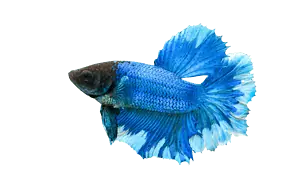Ich, or ‘ick’, is also known as white spot disease. Ich is one of the more common diseases of aquarium fish and is a parasitic infection.
The scientific name of ich is Ichthyophthirius multifiliis. It is a ciliated protozoan which means it is tiny and can swim.
Ich in betta fish is a common ailment in aquariums and is very treatable but deadly if left untreated.
Betta fish ich treatment consists of water changes and medicine.
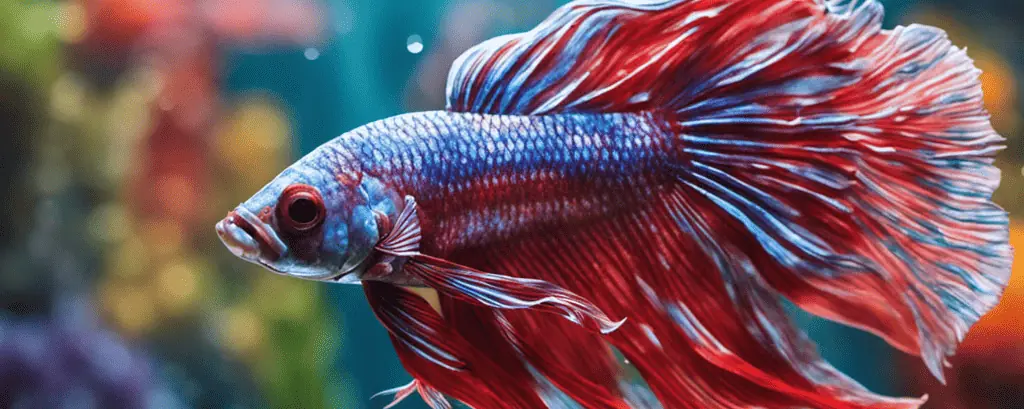
Table of Contents
The Main Causes of ich in betta fish
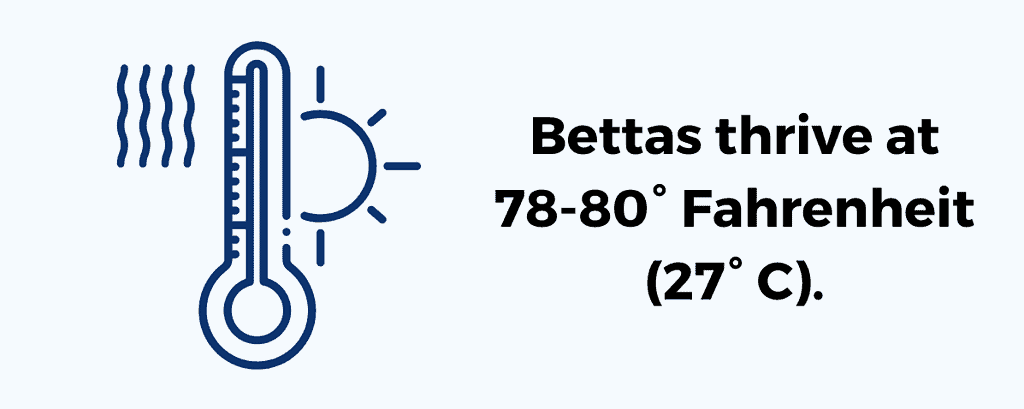
Water Conditions
Poor environmental conditions such as dirty water, stress, or a sick tank mate cause ich to take hold.
Quarantine newcomers to the tank for two to four weeks so they do not get your other fish sick.
This also gives any illnesses a chance to show up and be treated before they join the main tank.
Stress is a component of your fish’s health.
Poor water quality, overhandling, overcrowding, and poor feed can cause stress, making your fish vulnerable to disease.
Water quality is essential for your fish’s health.
Bettas do best in water from 78-80° degrees Fahrenheit (27° C).
Use a thermometer to check the water temperature and an aquarium heater to maintain it at this temperature.
The optimal pH in a betta tank is 7.0.
Use chemical testing to check the pH, ammonia, nitrate, and nitrite levels often. It is important to clean the substrate of the tank, the filters, and the lid regularly.
Added Stress
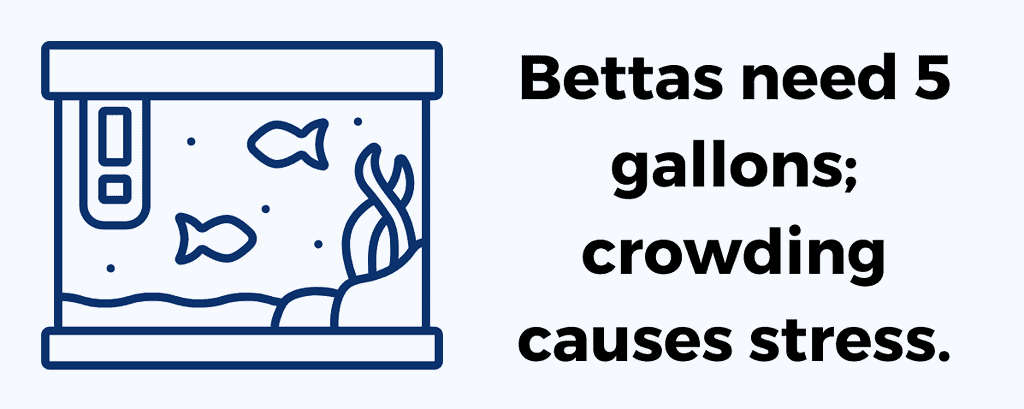
Handling your fish too often is stressful for your fish and disturbs the protective mucous layer on your betta’s skin.
This makes them vulnerable to illness, particularly diseases such as ich starting on the skin of the fish.
A betta needs at least 5 gallons of space. Crowding your betta in with other fish is stressful for them.
Other fish compete for space and resources and are sometimes aggressive. They can nip at your betta’s fins and cause injury.
Your fish needs good nutrition to be healthy. Feed your betta a varied diet of tropical fish flakes, betta pellets, frozen food, and live food.
Remember to source live food responsibly and do not feed your fish food from a pond or river outside. Live food may be a source of pathogens.
Spreading From Fish To Fish
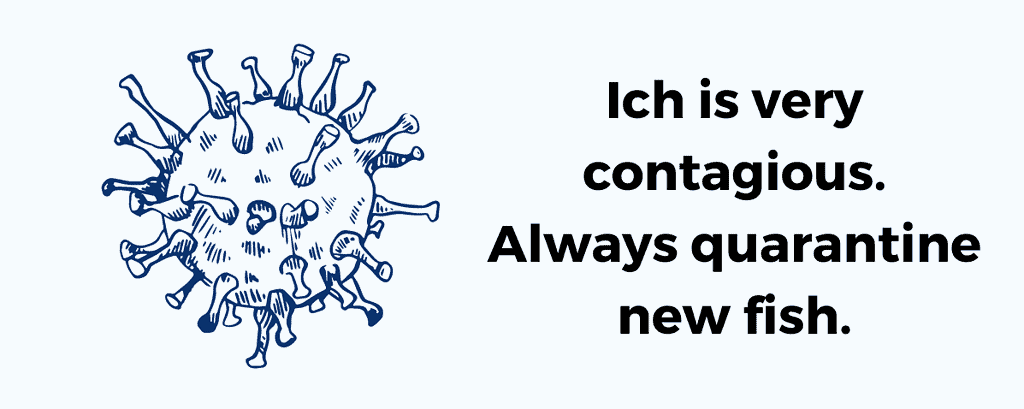
Ich is very contagious. Always quarantine new fish or aquatic plants to ensure they are not diseased.
The general rule is to keep the new fish or critters in an quarantine tank for two weeks before introducing them to your main population.
Two week is enough time to see if the fish has a pre-existing condition or parasite and prevent the fast spread in your main tank.
Remember to clean nets and other equipment you may use in both tanks. Even a droplet of water on your hands can transmit contagion.
Signs and Symptoms of Ich in betta fish

If you see signs such as small white dots on your betta fish’s gills, fins, or body, quarantine your betta right away.
Ich spots resemble sugar or salt granules and can begin with a few but cover your entire fish, making its skin look bumpy.
A diseased fish may rub against things in the aquarium to scratch the irritation ich causes.
This is called flashing because the fish’s lighter-colored belly “flashes” as the fish swims erratically.
Your betta may have a loss of appetite and lose its bright colors. It may have difficulty breathing and hang out at the top of the tank, gulping for air.
A sick fish will probably also suffer from a lack of appetite and lethargy. It will behave abnormally, isolating itself and being inactive.
Your betta may spend a lot of time resting on the bottom of the tank. It may also engage in upside-down swimming near the surface.
Your pet will also lose color and look pale.
It may become difficult for your fish to breathe as its gills become infested. It will look like it is breathing rapidly.
This will lead to respiratory failure and then death.
The Stages of Ich
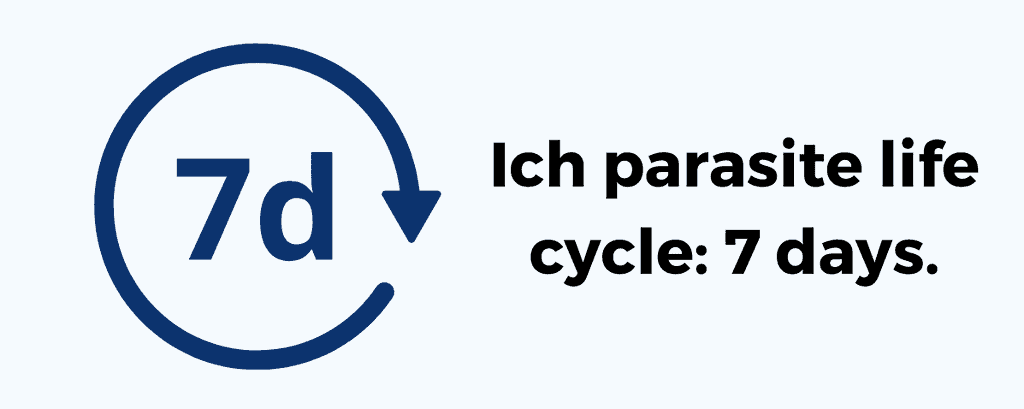
The ich parasite has a rapid life cycle of seven days and will overwhelm your tank if you do not treat it. There are three stages of life for the ich parasite.
The first stage is the feeding, or Trophont, stage.
This is when the parasite attaches to the fish and feeds on it for up to 5 days. Ich is not treatable at this stage.
The next stage is the Tomont stage.
The adult parasite detaches from the betta and finds an object in the tank or substrate to attach to. This is the reproductive stage.
The parasites divide rapidly up to ten times using binary fission.
The Theront stage is when the parasite is swimming freely before attaching to a host.
They have 48 hours to do so, or they die.
This is their most vulnerable stage, and when you treat and medicate your tank and fish.
With proper treatment, your tank can recover from the infestation.
How To Treat Ich In Your Bettas

First, quarantine the sick fish. Remove your betta from the tank and put it in a hospital tank you have set up.
From here, you have two main options:
- Raise the temperature
- Medicate
We recommend doing the temperature method first.
It’s not hard on the fish, and it works reasonably well.
Plus, if the betta doesn’t have ich, you won’t be medicating it unnecessarily.
Raise The Temperature
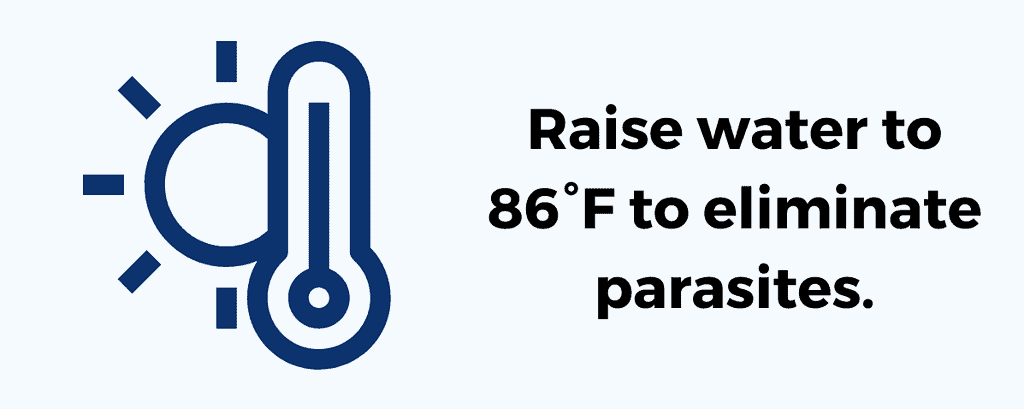
A simple method of eliminating the parasite is to raise the water temperature slowly over a day up to 86° degrees Fahrenheit (30° C).
Leave it there for up to ten days.
To find a new host, the parasites will leave the host fish.
The heated water will kill the parasites after they leave the betta. The heat will not kill the already attached parasites.
Continue treatment for at least 3 days after the last spot has disappeared. Use an antibacterial medication as your fish may have open wounds from the ich infestation.
After this is done, slowly return the water temperature to its normal range.
Use Medication
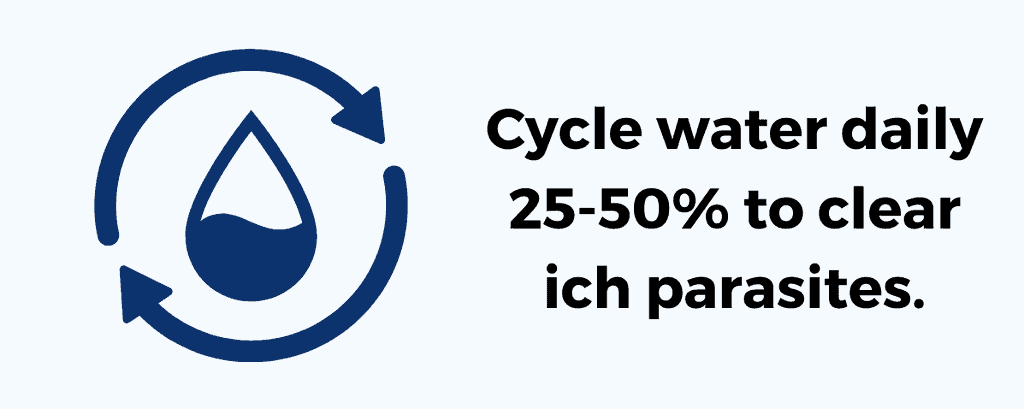
If the heat treatment does not work, give medications such as copper sulfate, malachite green, or formalin. Follow all directions on the medication.
We like this option on Amazon.
Cycle water daily from 25 to 50% to bring down high medication levels and clear out ich parasites in various stages of their life cycle.
It is important to catch all the ich organisms in a vulnerable state.
You might need to give 3 to 7 medication treatments over several days.
Make a saltwater solution of 1.5 to 3.0% salinity by putting five to ten tablespoons of aquarium salt into a bucket of one gallon of betta aquarium water.
Place the fish in the salt solution for 5 to 30 minutes.
If your fish looks distressed, do not continue treatment and put it back in its tank.
After its time in the salt bath is up, take some water from your fish’s normal aquarium and dilute the salt solution. This will prepare your fish for going back into the regular aquarium water.
Adding a small amount of aquarium salt to your tank will improve your betta’s slime coat or mucous layer. This coat is a natural protective barrier against parasites and bacteria.
Use one teaspoon of aquarium salt per two and a half gallons of water. Be very slow and careful when adding salt, as it is toxic in high doses.
It will adversely affect your plants and invertebrates.
Replace aquarium water regularly after using aquarium salt. Vacuum the substrate to get the salt out of the bottom of the tank.
Aquarium salt will also help prevent bacterial infections in any wounds your fish may have. Do not use table salt with iodine or anti-caking additives, or marine salt.
Aquarium, kosher, or canning salt are all OK to use in your tank.
Epsom salt is not salt and does not perform the same function. It is used for treating certain illnesses in your freshwater fish tank by altering the chemistry of the water.
Rather than being sodium chloride (NaCl) like regular salt, Epsom salt is magnesium sulphate, which contains magnesium, sulfate, and oxygen.
Keep Your Betta Healthy By Preventing Ich
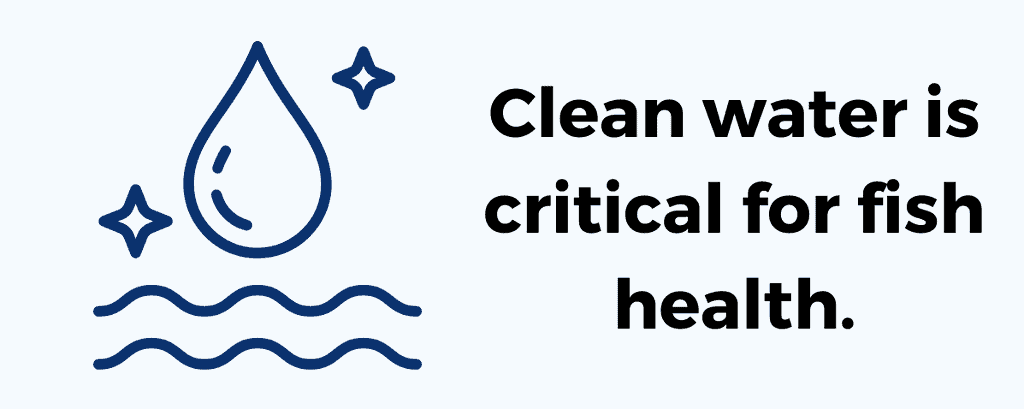
Preventing white spot disease requires good fishkeeping.
Maintaining water parameters in temperature, pH, ammonia, nitrites, and nitrates is important.
Clean water is the most critical factor in keeping your fish healthy. Perform regular partial water changes to prevent poor water conditions.
Prevention of betta fish diseases is much simpler than treatment.
Do not keep too many fish in one tank. Overcrowding is stressful, and they could injure each other.
Quarantine new fish for two to four weeks to ensure they are not diseased. Keep new plants quarantined as well.
Cleaning your plants gently is a good idea.
To clean your plants:
- Clean and rinse plants with normal tap water
- Mix 2-3 ml 3 percent hydrogen peroxide with 1 gallon of water
- Dip the plants in this solution for 5 minutes at the most.
- Rinse plants well in tap water
- Treat the plants with water conditioner, then rinse again
Harmful bacteria or viruses can enter your original aquarium via equipment, too.
Anything coming in contact with a sick fish or contaminated water is dangerous.
Ensure you wash your hands, as contamination can travel in water droplets on your hands or arms.
Commonly Asked Betta Ich Questions

How long does it take for ich to develop in betta fish?
Ich can develop in betta fish in only a few days or as long as a few weeks, depending on the circumstances. Water temperature plays a big part. The ich protozoa like warm water conditions for reproducing but not above about 82° degrees Fahrenheit (28° C).
After the ich attaches to your fish, it becomes infectious again after about six days. This is at about 78° degrees Fahrenheit (26° C) which is the average temperature of a tropical aquarium.
Raising the tank’s temperature will kill off more of the protozoa in the swimming stage because it speeds up their life cycle, and more of them will get medicated. This increase in temperature may be stressful for your fish and requires caution.
Can ich in betta fish be cured?
Ich in betta fish is treatable and curable, but fish are always vulnerable. Treating ich can involve raising the aquarium’s temperature, medications, or both. Some fish owners use salt baths as well.
Proper tank hygiene will go a long way toward preventing future ich outbreaks.
Is ich contagious to other fish?
Ich is highly contagious to other fish. Removing an ich-affected betta fish before treatment is important. This will make sure the disease is not spread. Isolating the fish for treatment ensures you do not medicate or harm a healthy fish.
Ensuring you provide good water quality and a healthy diet for your fish will help prevent stress. Stress reduces fish immunity to disease.
Keeping your fish healthy and ich-resistant will prevent an ich outbreak.
Keeping Your Betta Happy and Healthy
Experienced fish keepers know how crucial regular fish care is to preventing illness. Maintain a clean fish tank by cleaning it weekly.
Do not have too many fish per volume. Feed fish the right amount of nutritious food.
Do not overhandle your fish. A stressed fish becomes a sick fish.
Learn about all of the common betta diseases to watch out for in our massive and detailed guide here.

